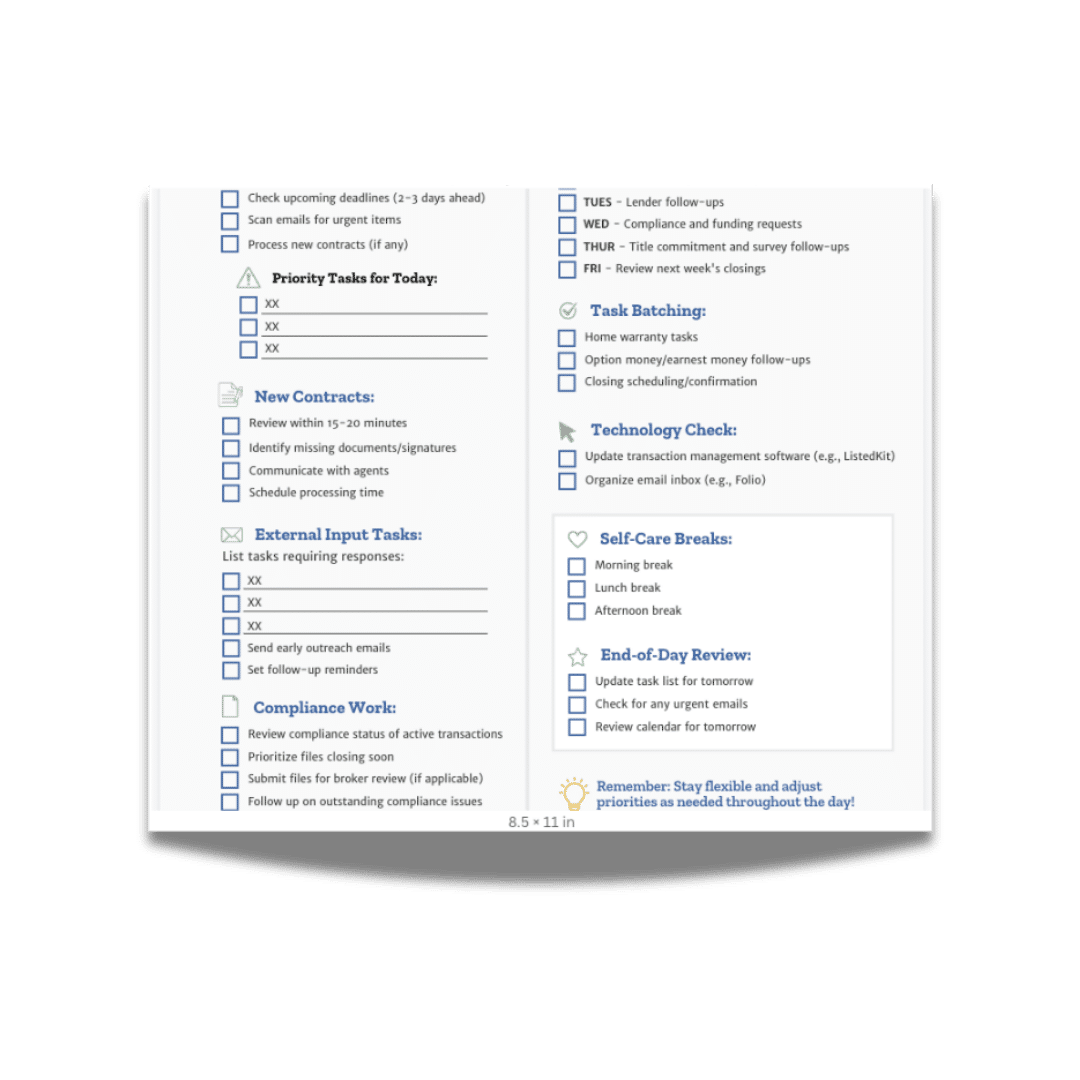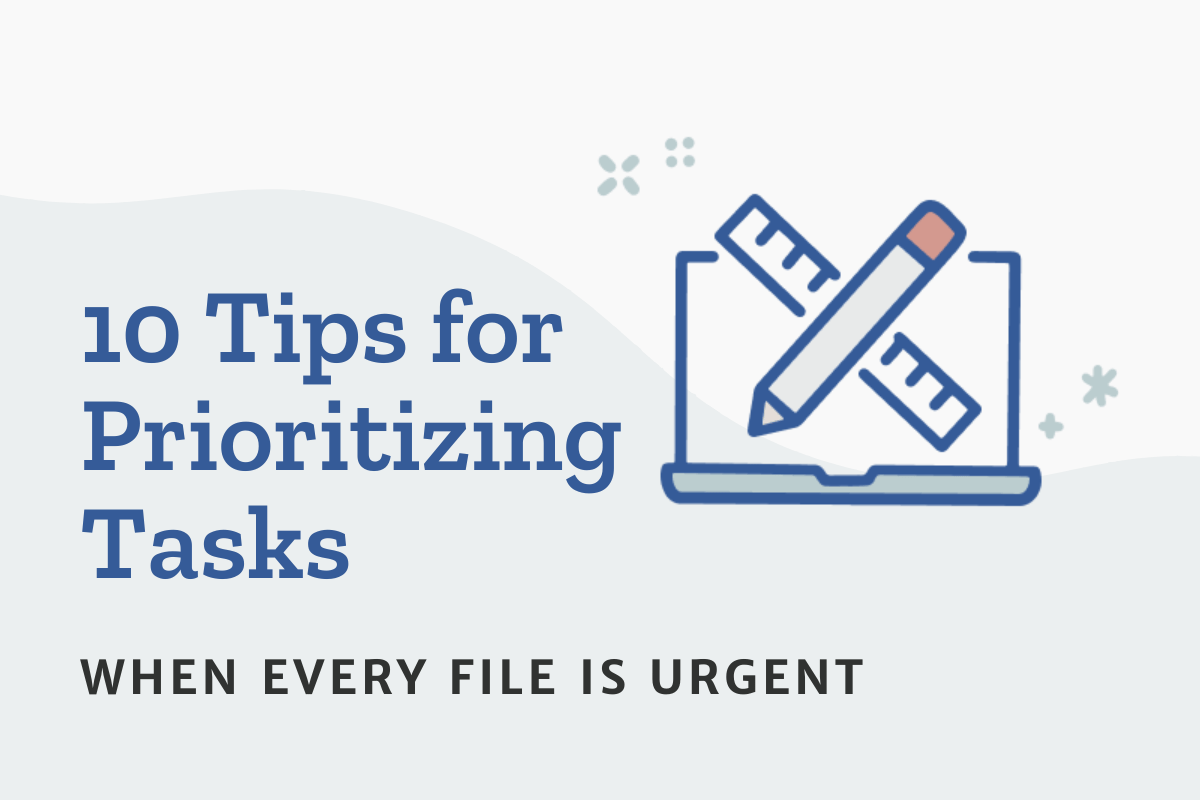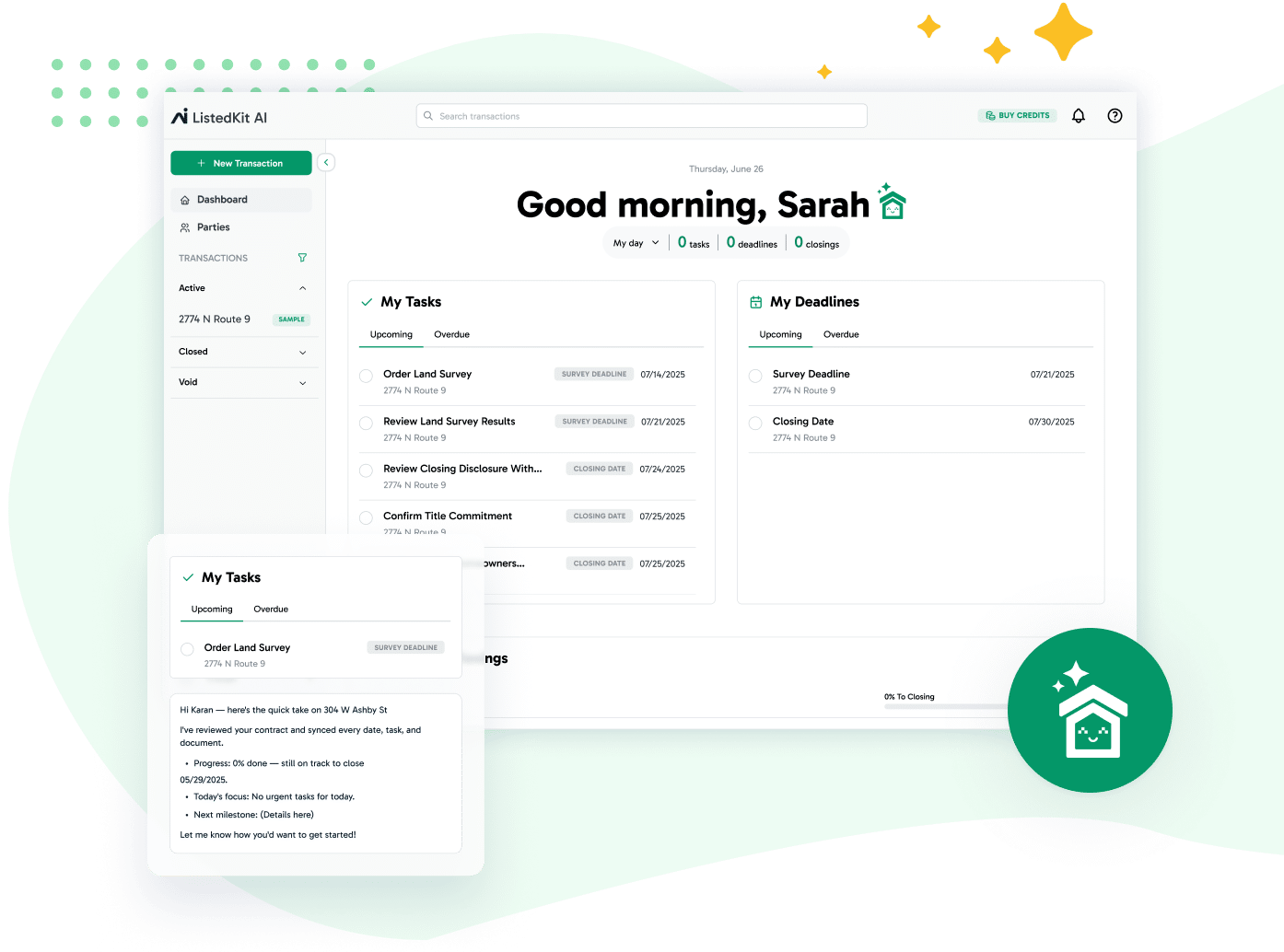As a transaction coordinator (TC) juggling numerous real estate deals, knowing how to prioritize tasks is crucial for success. This comprehensive guide will help you focus on high-impact activities and efficiently manage a high volume of transactions, drawing insights from our conversation with experienced TC and coach Kristi Winfree.
1. The Foundation: Understanding Task Batching
Before diving into specific strategies, it’s important to grasp why learning how to prioritize tasks is essential for TCs.
“Task batching is where you take like-minded tasks and you group them together and work on them at the same time. It helps you be more efficient because it keeps you from… your mind going in all different directions.”
Kristi Winfree
Task batching is the cornerstone of efficient transaction management. By grouping similar tasks, you minimize context switching and maximize productivity. For instance, you might batch all home warranty tasks across multiple transactions, rather than jumping between different stages of various deals. Real estate-specific task management tools like ListedKit are built to help you do that by offering a one-page view of tasks across all your transactions.
2. Start Your Day Right: Calendar Review and Planning
The foundation of effective prioritization is a thorough understanding of upcoming deadlines and important dates.
“Your calendar dates are always going to be your high priority. Checking your calendar as one of your very early morning tasks is really important.”
Kristi Winfree
Here’s how to implement this crucial practice:
a) Morning Calendar Review:
– Start each day by reviewing your calendar
– Identify all due dates and deadlines for the current day
– Look ahead 2-3 days to anticipate upcoming tasks
b) Weekly Planning:
– On Fridays, review dates through the following Tuesday
– This practice ensures you’re prepared for the start of each week
c) Create a Daily Task List:
– Based on your calendar review, create a prioritized task list for the day and add these to your management software
– Include both deadline-driven tasks and ongoing responsibilities

Daily Planner For TCs: Free Canva Template
3. Prioritize New Contracts
When new deals enter your pipeline, they should take immediate precedence.
“New contracts are always priority because you have to get those out quickly… especially if it’s a buyer, they’re going to have to deliver that option money and earnest money so time is of the essence.”
Kristi Winfree
Here’s how to handle new contracts efficiently:
a) Quick Review:
– Aim to review new contracts within 15-20 minutes of receipt
– Quickly identify any missing documents or signatures
b) Communicate Promptly:
– Reach out to agents about any outstanding items
– Provide a clear timeline for next steps
c) Integration into Workflow:
– While new contracts are a priority, don’t let them completely derail your planned tasks
– Allocate specific times to process new contracts, such as mid-morning and mid-afternoon
4. Focus on Tasks Requiring External Input
High-impact tasks often involve coordination with other parties.
“Think about the tasks that people have to respond to you on and it’s not just a simple task that you can just do yourself. Those are going to be high-impact tasks as well because now you’re depending on somebody else’s turn time and response time.”
Kristi Winfree
To manage these effectively:
a) Early Outreach:
– Identify tasks needing input from agents, clients, lenders, etc.
– Send follow-up requests early in the day to allow for response time
b) Set Clear Expectations:
– When requesting information, provide clear deadlines
– Explain the importance of timely responses to keep the transaction on track
c) Effective Follow-up:
– Set reminders to check on outstanding items
– Use a mix of communication methods (email, phone, text) for follow-ups
5. Tackle Compliance Early and Consistently
Compliance documentation is a critical yet time-consuming aspect of transaction management. Kristi recommends a proactive approach:
“Our standard for our company is that they have the file submitted at least two weeks prior to closing and it needs to be compliant a week prior to closing.”
Implement these strategies for effective compliance management:
a) Early Initiation:
– Start compliance work as soon as possible after receiving a file
– Create a compliance checklist for each brokerage you work with
b) Regular Review:
– Set aside time each week to review the compliance status of all active transactions
– Prioritize files with upcoming closing dates
c) Broker Communication:
– Aim to submit files for broker review 2 weeks before closing
– Follow up promptly on any compliance issues raised by the broker
6. Implement Daily and Weekly Task Structures
Kristi suggests creating a structured approach to task management:
“We have daily tasks and day of the week tasks… When we come in, the first thing we do is we scan through our email for anything that’s urgent as well as those new contracts.”
Here’s how to create an effective task structure:
a) Daily Tasks. Example;
– Email review for urgent items
– Calendar check and deadline review
– New contract processing
– Follow-up on outstanding items
b) Day-specific Tasks. Example;
– Mondays: Week planning and catch-up
– Tuesdays: Lender follow-ups
– Wednesdays: Compliance and funding requests
– Thursdays: Title commitment and survey follow-ups
– Fridays: Review next week’s closings
7. Leverage Technology for Enhanced Prioritization
Utilizing the right tools can significantly improve your ability to prioritize and manage tasks. Kristi recommends several key technologies:
a) Transaction Management Software:
– Use platforms like ListedKit to manage checklists and email templates
– These tools help standardize processes across multiple transactions
b) Email Organization Tools:
– Winfree recommends Folio and Gmail tasks for email management
– Such tools can help categorize emails by transaction and highlight important dates
c) Project Management Platforms:
– Utilize tools like Listedkit for a high-level view of all transactions and Google Calendar to highlight important dates
– Create custom views for different stages of the transaction process
8. Balancing Flexibility with Structure
While having a structured approach is crucial, it’s equally important to maintain flexibility. Winfree advises:
“The flexibility in this role is going to depend on how many files that you’re handling… When you’re handling 35-40, you know that is a full-time position so it’s not as flexible.”
Tips for maintaining balance:
a) Time Blocking:
– Allocate specific time blocks for different types of tasks
– Include buffer time for unexpected urgent matters
b) Prioritize Self-care:
– Schedule short breaks throughout the day
– Step away from your desk periodically to maintain focus
c) Adjust as Needed:
– Be prepared to shift priorities based on urgent matters
– Regularly reassess your task management approach
9. Continuous Improvement and Documentation
To scale your TC business effectively, focus on continuous improvement:
a) Regular Process Review:
– Periodically assess your workflows and look for inefficiencies
– Be open to changing processes that aren’t working optimally
b) Document Everything:
– Create detailed process documents
– Use video tools like Loom to create visual guides
Winfree emphasizes: “Start documenting everything… everything you do that you want somebody else to be able to do, document it.”
c) Seek Feedback:
– Regularly ask for feedback from agents and clients
– Use this input to refine your prioritization strategies
10. Scaling Your TC Business
As you become more efficient in managing high-impact tasks, you’ll be better positioned to scale your business.
Consider these scaling strategies:
a) Standardize Processes:
– Create uniform checklists and email templates
– Ensure all team members follow the same prioritization principles
b) Invest in Training:
– Develop a comprehensive training program for new team members
– Include both technical skills and prioritization strategies
c) Leverage Technology for Growth:
– Choose scalable software solutions
– Regularly assess if your tech stack can support your growth plans
Closing Thoughts
Mastering how to prioritize tasks is crucial for transaction coordinators managing multiple real estate deals. By focusing on high-impact tasks, leveraging effective tools, and continuously refining your processes, you can successfully handle an increasing workload without sacrificing quality.
Remember, the key is to be proactive, stay organized, and maintain a balance between structure and flexibility. Embrace this mindset of continuous improvement, and you’ll be well-equipped to thrive in the dynamic world of real estate transaction coordination.




